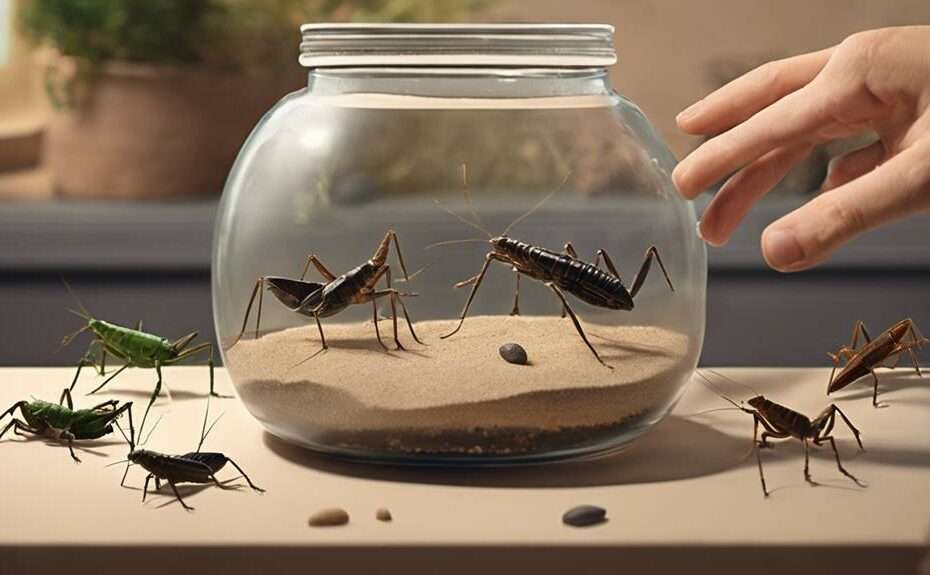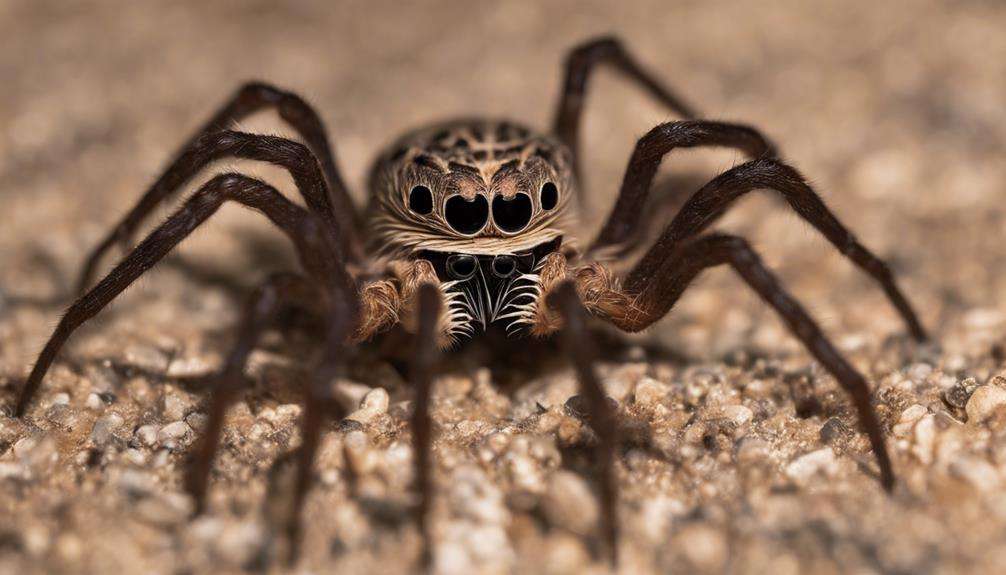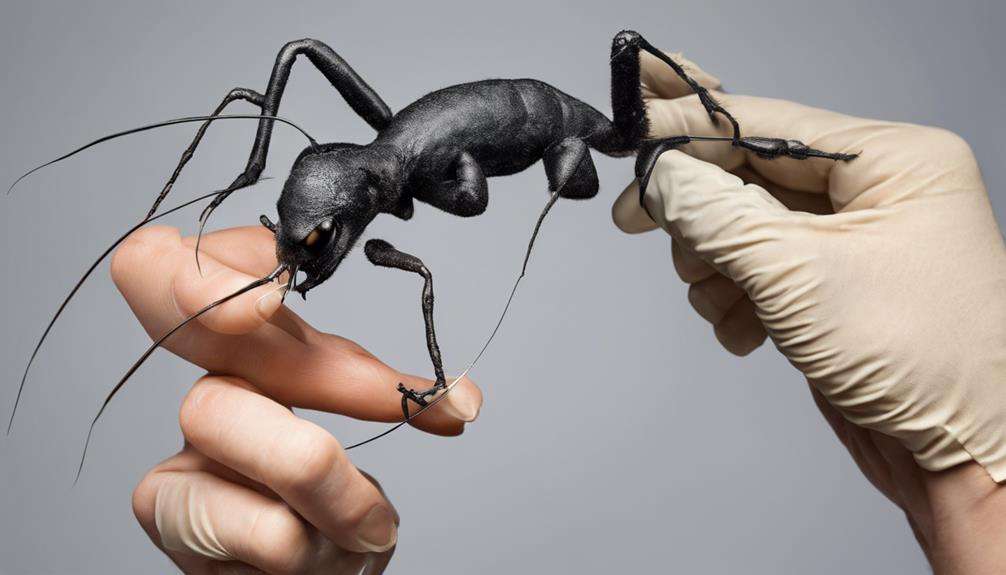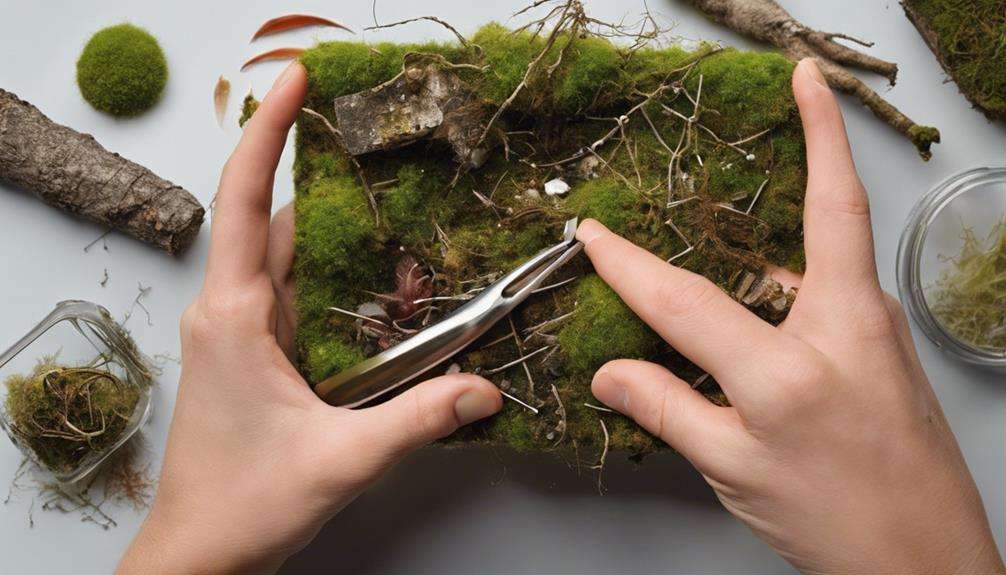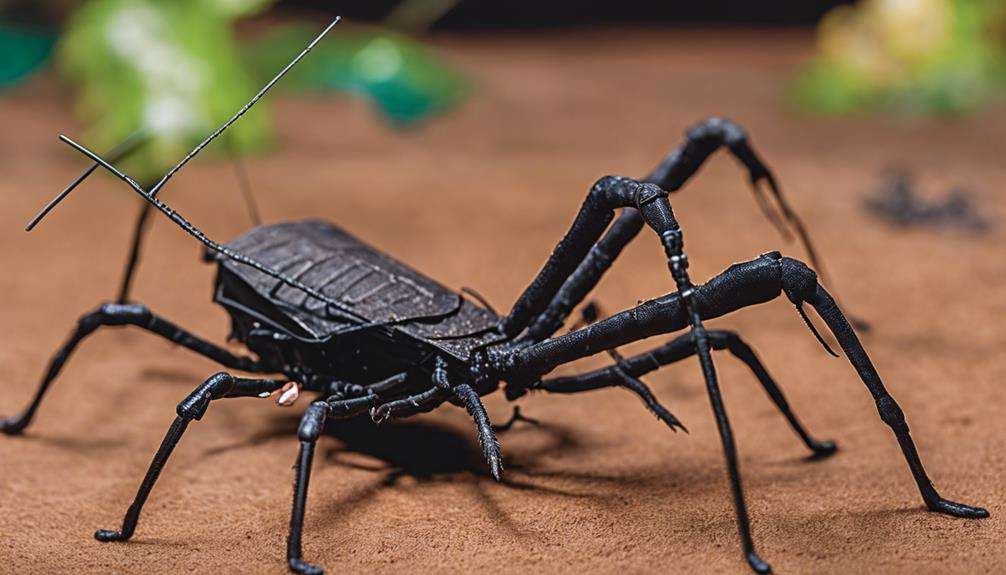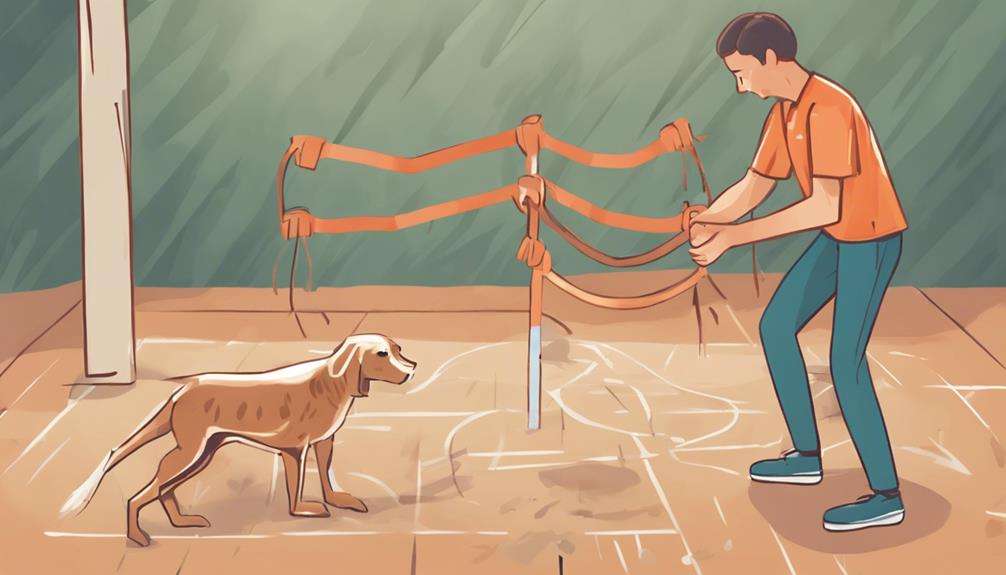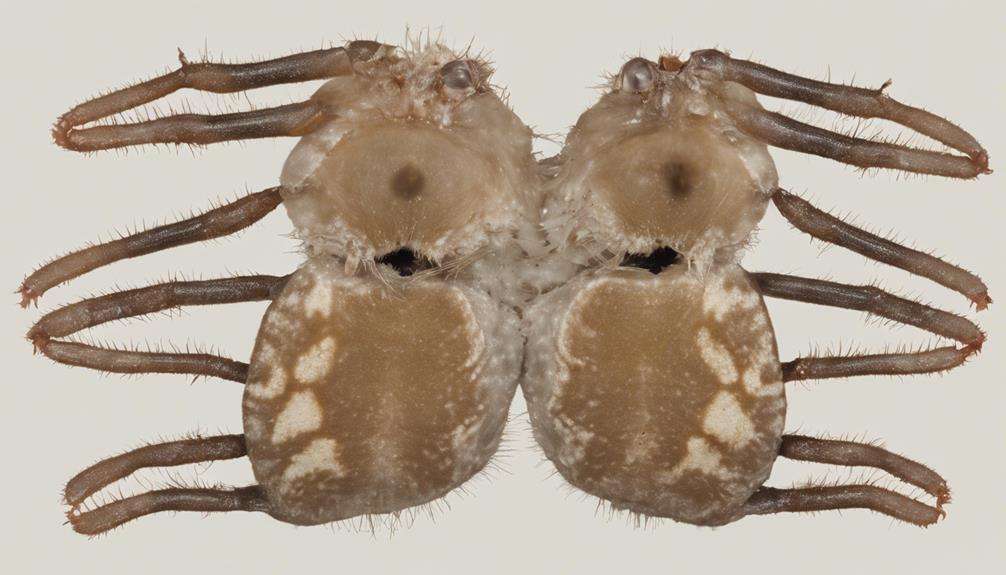If you've ever felt intrigued by the mysterious world of scorpions and are considering them as pets, there are crucial aspects you need to understand to provide proper care.
From setting up their habitat to ensuring their nutritional needs are met, caring for pet scorpions requires attention to detail and specific knowledge.
Discovering the intricacies of their care could lead you to a rewarding journey of companionship with these fascinating creatures.
Key Takeaways
- Choose a suitable terrarium and substrates for your scorpion's habitat needs.
- Maintain consistent temperature and humidity levels in the enclosure.
- Monitor scorpion behavior and health regularly for signs of distress.
- Feed live insects, handle with care, and provide a secure environment for your pet scorpions.
Scorpion Appearance and Behavior
Scorpions possess eight legs, two pincers, and a segmented exoskeleton, defining their appearance and aiding in their hunting and defense mechanisms. These fascinating arachnids come in various species, with the desert scorpion being a popular choice among pet owners. Being nocturnal creatures, they're most active during the night, using their pincers to grab and crush prey while their venomous stinger serves as a potent defense mechanism.
In the wild, scorpions burrow into the ground during the day, seeking shelter and protection. When caring for a pet scorpion, ensure they've a suitable habitat with hiding places to mimic their natural environment. Providing clean water in a shallow dish is essential for maintaining hydration, as these creatures can be sensitive to dehydration. The exoskeleton of scorpions is a crucial feature, offering protection and structural support. Understanding these aspects of their appearance and behavior is vital for creating a conducive environment for your pet scorpion.
Creating the Ideal Habitat
For an optimal habitat setup for pet scorpions, consider selecting a small to medium terrarium that meets the specific requirements of the species of scorpion you plan to keep. Different species have varying needs, such as burrowing space or climbing areas, so research your scorpion's needs beforehand.
Use suitable substrates like sand or a sand-soil mix, depending on the species of scorpion you have. Introduce desert plants into the terrarium to help regulate humidity levels, ensuring they've a familiar environment.
Maintain a consistent temperature between 25°C and 30°C, as scorpions are sensitive to extreme temperatures. External heat sources like heating pads or heat lamps can help achieve this.
Proper humidity levels are crucial to prevent scorpions from drying out, especially during their shedding process. Monitor the humidity levels regularly and adjust as needed to create a comfortable and safe habitat for your pet scorpions.
Essential Supplies for Scorpions
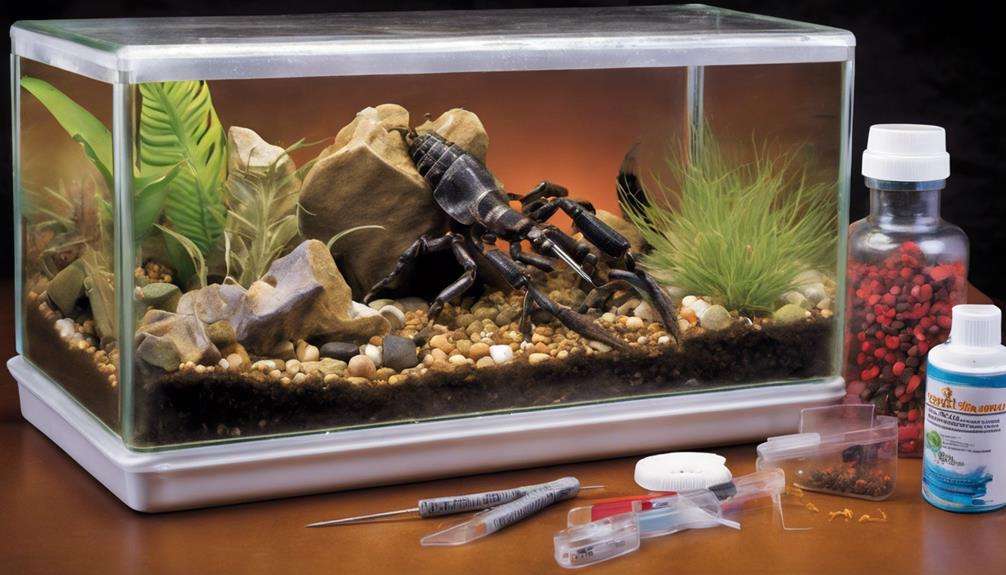
To ensure the well-being of your pet scorpion, acquiring the necessary supplies is essential for creating a comfortable and secure habitat. Start with a 10-gallon or larger tank with a secure lid to prevent escapes.
Choose a substrate like sand or a soil mix to mimic their natural environment, and add flat rocks and hiding spots for security. Provide a water dish for drinking, ensuring it doesn't flood the substrate as scorpions are susceptible to drowning.
Additionally, consider incorporating UV lights to aid in the molting process by helping harden the new exoskeleton. To maintain the ideal temperature of around 25°C, use heating elements like heat mats, crucial for your scorpion's well-being.
Maintaining Scorpion Health
When it comes to maintaining the health of your pet scorpion, vigilance and proactive care are key components for ensuring their well-being. Regularly monitor your scorpion's behavior, appetite, and exoskeleton condition to catch any potential health issues early on. Keep an eye out for red flags such as swollen limbs, lethargy, weight loss, or abnormal feces, as these could indicate underlying problems like dehydration, lethargy, or difficulties with shedding.
Creating a suitable habitat for your scorpion is crucial to their health. Ensure they have a proper burrow to hide and feel secure, as scorpions are nocturnal creatures that need a dark and quiet environment. If you notice any unusual symptoms or behaviors, don't hesitate to consult a veterinarian specializing in exotic pets. They can provide valuable insights and guidance on how to address any health concerns that may arise. Remember, monitoring your scorpion's health regularly and seeking professional help when needed are essential aspects of responsible scorpion care.
Feeding and Handling Tips
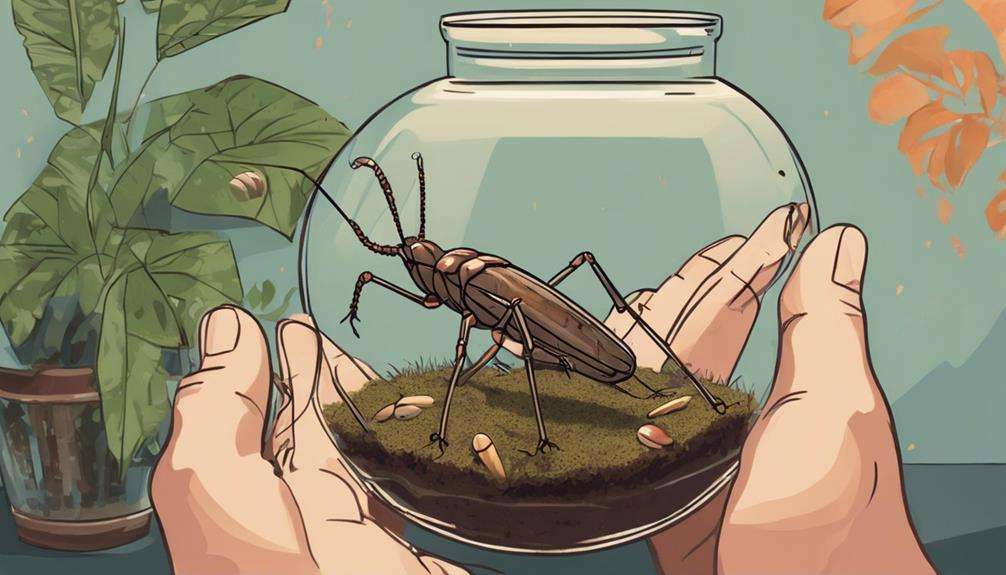
Maintaining the health of your pet scorpion involves providing them with a balanced diet and handling them with care to ensure their well-being. Feed your scorpion live insects such as crickets or mealworms every 3-7 days to ensure they receive proper nutrition. Remember to gut-load the insects before feeding them to your scorpion to enhance their nutritional value. Adjust the feeding frequency based on your scorpion's size and appetite, offering a variety of prey like insects, spiders, and lizards to keep their diet varied.
When it comes to handling your scorpion, it's best to avoid it whenever possible. If handling is necessary, use long tweezers or gloves to prevent accidental stings. Additionally, provide a water dish in the enclosure for your scorpion to drink from, ensuring that the water doesn't flood the substrate. Keep an eye on your scorpion's shedding process, as they may require extra care and moisture during this time. By following these feeding and handling tips, you can help ensure the well-being of your pet scorpion.
Frequently Asked Questions
How Do You Take Care of a Scorpion for Beginners?
To care for a scorpion as a beginner, focus on providing proper habitat setup, feeding habits, and temperature requirements. Remember to handle with care, conduct regular health checks, and consult a vet if needed.
Are Scorpions Good Pets for Beginners?
Scorpions can make good pets for beginners. Opt for beginner-friendly species with easy care needs. They require a proper housing setup, specific feeding requirements, cautious handling, and awareness of common misconceptions, health concerns, and bonding opportunities.
How Do You Handle a Pet Scorpion?
When handling a pet scorpion, remember to use long forceps or gloves for safety. Avoid sudden movements to prevent startling them. Keep the enclosure secure during handling to prevent escapes. Seek medical attention if stung.
What to Know Before Buying a Scorpion?
Before buying a scorpion, research scorpion species, housing needs, feeding habits, environmental conditions, handling precautions, health risks, lifespan expectations, and behavioral characteristics. Understanding these aspects is crucial for providing proper care to your scorpion.
Conclusion
In conclusion, caring for pet scorpions requires attention to detail and dedication.
By creating the ideal habitat, providing essential supplies, monitoring their health, and following feeding and handling tips, you can ensure a fulfilling life for these unique arachnids.
Remember to prioritize their well-being by maintaining a safe and comfortable environment, and don't hesitate to seek veterinary assistance when needed.
With proper care and attention, your pet scorpions can thrive and bring enjoyment to your life.
